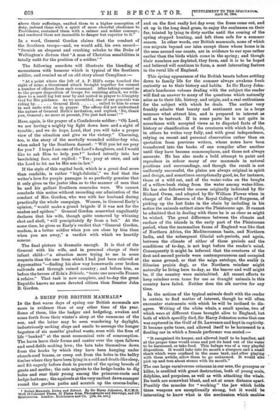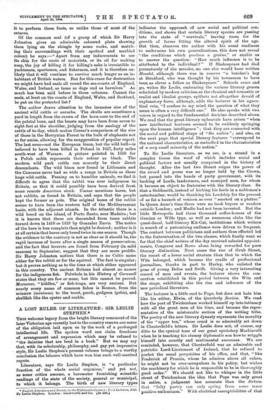Of the common seal (of a group of which Sir
Harry Johnston gives an admirable coloured plate showing them lying on the shingle by some rocks, and match- ing their surroundings with their spotted and marbled
colour) he says Apart from any inducements to use its skin for the coats of motorists, or its oil for making soap, the joy of killing it for killiug's sake is irresistible to yachtsmen, sportsmen, and fishermen, and it is therefore un- likely that it will continue to survive much longer as an in- habitant of British waters. But for this craze for destruction we might have had seals all round the seacoasts of England, Wales, and Ireland, as tame as dogs and as harmless." As much has been said before in these columns. Cannot the seals, at least on the coasts of England, Wales, and Scotland, be put on the protected list The author draws attention to the immense size of the ancient wild cattle or aurochs. The skulls are sometimes a yard in length from the crown of the horn-core to the end of the palatal bone, and the beasts may have been from seven to eight feet at the shoulder, judging from the analogy of the cattle of to-day, which makes Caesar's comparison of the size of those in the Hercynian Forest to the bulk of elephants not so far amiss, allowing for the exaggeration of popular report. The last urus—not the European bison, but the wild bull—is believed to have been killed in Poland in 1627, forty miles south-west of Warsaw. A picture painted in 1550 for a Polish noble represents their colour as black. The modern wild park cattle can scarcely be their direct descendants. The wild bison now found in Lithuania and the Caucasus never had so wide a range in Britain as these huge wild cattle. Passing on to humbler animals, we find it difficult to agree that the rabbit was ever indigenous in; Britain, or that it conld possibly have been derived froM some remote American stock. Caesar mentions hares, but not rabbits, as found in Britain, and says that the people kept the former as pets. The original home of the rabbit seems to have been the western half of the Mediterranean basin, with the adjacent islands. In the Atlantic there is a wild breed on the island, of Porto Santo, near Madeira ; but it is known that these are descended from tame rabbits turned down in 1418 or 1419 by Gonzalez ZEUTO. The notice of the hare is less complete than might be desired; neither is it at all certain that hares only breed twice in one season. Though the evidence to the contrary is not as clear as it should be, the rapid increase of hares after a single season of preservation, and the fact that leverets are found from February (in mild seasons) to September, suggest that they are more prolific. Sir Harry Johnston notices that there is no Celtic name either for the rabbit or for the squirrel. The fact is singular; but it proves nothing as to the time at which either appeared in this country. The ancient Britons had almost no names for the indigenous fish. Polwhele in his History of Cornwall states that they ate few or none, but this cannot be proved. Moreover, "kiddies," or fish-traps, are very ancient. But nearly every name of common fishes is Roman, from the minnow (minima) to the trout, perch, gudgeon (polio), and shellfish like the oyster and cockle.
A LOST RULER OF LITERATURE : SIR LESLIE STEPHEN.* Tons welcome legacy from the bright literary ornament of the laterVictorian age recently lost to the country renews our sense of the obligation laid upon us by the work of a prolonged intellectual life. The spoken word can claim freedoms of arrangement and expression which may be refused to " the dainties that are bred in a book." But we may say that, with its scholarship, philosophy, and gay yet impressive style, Sir Leslie Stephen's present volume brings to a worthy conclusion the labours which have won him such well-merited repute.
Literature, says Sir Leslie Stephen, is "a particular function of the whole social organism," and yet not, as some critics assume, a barometer furnishing scientific readings of the state of the society, general or municipal, to which it belongs. The birth of new literary types
• English Literature and Sockto in the Eighteenth Century Ford Lecture., IC03. Br Leans Stepheu. Loudozt: Duckeerth sod Ea. (5....4.1 indicates the approach of new social and political con- ditions, and shows that certain literary species are passing into the state of "survivals," leaving room for the growth of forms fitting the altered spirit of the age. But then, observes the author with his usual readiness to undermine his own generalisations, this does not reveal "the conditions which produce a genius," or enable us to answer the question: "How much influence is to be attributed to the individual ? " If Shakespeare had died prematurely of the measles, no one else would have written Hamlet, although there was in reserve "a butcher's boy at Stratford, who was thought by his townsmen to have been as clever a fellow as Shakespeare." Schools come and go, writes Sir Leslie, embracing the various literary genera scheduled by modern criticism as the classical and romantic or realist and idealist groups, epithets not altogether devoid of explanatory force, although, adds the lecturer in his agnos- tical vein, "I confess to my mind the question of what they mean is often a very difficult one." He also speaks with two voices in regard to the fundamental doctrine described above. We read that the great literary upheavals have arisen "when new intellectual horizons seemed to be suddenly springing upon the human intelligence " ; that they are connected with the social and political shape of "the nation"; and also, on the next page, that special literary features "correspond to the national characteristics, as embodied in the characteristics of a very small minority of the nation."
To Sir Leslie literature, as we see, is a strand in a complex tissue the woof of which includes social and political factors not usually comprised in the history of thought. After the last two Stuart reigns the power of the sword and purse was no longer held by the Crown, but passed into the hands of party government, with its backing of Lords, landowners, and moneyed men, for whom it became an object to fraternise with the literary class. So that a Goldsmith, instead of kicking his heels in a nobleman's antechamber, would be thanking his Lordship for the present of as fat a haunch of venison as ever "smoked on a platter." In Queen Anne's time there were no book buyers or readers outside London ; and khaki had not been invented. But the little Metropolis had three thousand coffee-houses of the Grecian or Willa type, as well as numerous clubs like the quasi-ducal, half-literary Kit-Cat, institutions which writers in search of a patronising audience were driven to frequent. The contact between politicians and authors thus effected led to the fraternisation of the two classes, which finally went so far that the chief writers of the day received salaried appoint- ments, Congreve and Rowe alone being rewarded for pure literary distinction. Next came the rise of Grub Street, the resort of a lower social stratum than that to which the Wits belonged, which became the cradle of professional journalism, thanks in part to Harley, who enlisted the pens of young Defoe and Swift. Giving a very interesting record of men and events, the lecturer shows the con- nection established in this period between the Wits and the stage, exhibiting also the rise and influence of the new periodical literature.
The lecturer is a little cool to Pope, but does not hate him like his editor, Elwin, of the Quarterly Review. We read bow the poet of Twickenham worked himself up into intimacy with all the great men of his time, and became the repre- sentative of the aristocratic section of the writing tribe. The poetry of the new literary dynasty represents the morality of the "upper ten," whose creed is so admirably set down in Chesterfield's letters. Sir Leslie. does not, of course, say ditto to the cynical tone of our great epistolary Machiavelli when he is teaching his clumsy diplomatic son how to wriggle himself into courtly and sentimental successes. We ale reminded, however, that Chesterfield was an admirable and patriotic Lord-Lieutenant of Ireland, that he refused to pocket the usual perquisites of his office, and that, "like Frederick of Prussia, whom he admires above all rulers, he might not be over-scrupulous in his policy, but wisher; the machinery for which he is responsible to be in thoroughly good order." We should not like to whisper in the little street of Twickenham the idea that Pope was only great in satire, a judgment less accurate than the dictum that "lofty poetry can only spring from some inner positive enthusiasm." With electrical susceptibilities of that























































 Previous page
Previous page